Tiefland Further Reading
Table of Contents
Biographical notes: Eugen D'Albert by Ian Lace
Biographical notes: Àngel Guimerà from L'Associació d'Escriptors en Llengua Catalana
Plot and musical analysis by George P. Upton
Detailed synopsis by Leo Melitz
Review of the Marton/Kollo recording of Tiefland by Ian Lace
by Robert von Dassanowsky
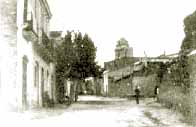
Catalan Landscape circa 1900
Biographical notes: Eugen D'Albert
Ian Lace, Music on the Web (UK), 1999

Eugen D'Albert was born in Glasgow in 1864. He bore a French name of
Italian origin, was German by adoption and died a Swiss citizen in 1932
in Riga! His parents moved south to Newcastle when he was very young and
he was drilled as a public pianist at a very early age. He hated England
and after several years in London made his way to Vienna at the age of
17. He composed 22 operas taking in every "problem" story ever tackled
in opera from Wagner to Krenek's "Johnny spiel auf". Tiefland (1903), in
the Italian 'verismo' style, shows influences of Wagner and Richard
Strauss and there is much use of Viennese waltz forms. D'Albert's
orchestration is sumptuous. It is set in Spain; partly on an isolated
mountain slope in the Pyrenees and partly in a lowland valley in
Catalonia. D'Albert always keen to soak up local colour and atmosphere,
went on a walking tour of the region and had a musical scholar obtain
Spanish dance tunes and shepherd's calls for him. For D'Albert,
authenticity was an integral part of naturalism.
Biographical notes: Àngel Guimerà
L'Associació d'Escriptors en Llengua Catalana
Àngel Guimerà (Santa Cruz de Tenerife, 1845 - Barcelona, 1924) was a
playwright and poet, the only 19th century Catalan playwright to be
performed elsewhere in Europe. He began his literary career as a poet,
was declared "Mestre en Gai Saber" (Master in the Art of Poetry) in 1887
and presided over the 1889 Jocs Florals (Literary Contest) in Barcelona.
His first tragedy in verse "Gala Placídia" (1879) is situated within the
romantic-historic tradition. With his "Mar i cel" (Sea and Sky) of 1888,
he had an unprecedented success, the work being translated into eight
languages which brought the author into the international arena. This
work was the beginning of his most productive period which would last
until 1900, a period in which most of his representative works were
staged: "Maria Rosa" (1894) and "Terra baixa" (The Lowlands) in 1897,
along with "La filla del mar" (Daughter of the Sea) (1900) which were
brought more than once to the cinema screens. These works portray, with
realistic touches, life in Catalonia at the time. He was elected
President of the Lliga de Catalunya and his political speeches made all
over Catalonia are collected in the volume "Cants a la patria" (Hymns to
the Nation) of 1906. In 1909 he was given a multitudinous popular
homage. He was an early member of the Institut d'Estudis Catalans
(1911).
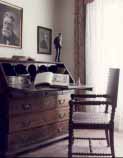
Guimerà's study
Plot and musical analysis of Tiefland
George P. Upton, The Standard Operas Their Plots and Their Music, 1928
(new edition, enlarged and revised by Felix Borowski)
"TIEFLAND" is a musical setting of a well-known and popular Spanish
drama, originally written in Catalonian by Angel Guimera, and called
"Tevva Baixa." The Spanish dramatist, José Echegaray, next produced, a
version of it, called "Tierra Baja." An English version has been made
familiar to American audiences by the actress, Bertha Kalich, as "Marta
of the Lowlands." The libretto of "Tiefland" was adapted from the
Catalonian version by Rudolph Lothar.
The opera was first produced in Prague in November 1903, but without
marked success. It was then revised by D'Albert and brought out in
Hamburg in 1907, also in Berlin, and had a long run in both cities. Its
first performance in this country took place in New York, November 23,
1908.
The opera is divided into a prologue and three acts. The prologue opens
among the Pyrenees Mountains and discloses the shepherd Pedro tending
his flocks. He lives in solitude but has dreamed that the Lord will
sometime send him a wife. The rich landowner Sebastiano appears and
informs Pedro that he has brought the young girl Marta to him for his
wife, and that he must leave the mountains and go down to the Lowlands
for his wedding. Pedro, thinking his dream is realized, is overjoyed at
the prospect, although Marta is unwilling and will not even look at
Pedro. Behind Sebastiano's apparently generous proposal, however, is a
dark plot. Years before this, Marta, the daughter of a strolling player,
had come to the Lowlands where Sebastiano dwelt and had been induced to
live with him as his mistress in consideration of his gift of a mill to
her father. As Sebastiano is now about to wed an heiress, he has plotted
to marry Marta to Pedro, and at the same time continue his illicit
relations with her.
The first act is devoted to Pedro's arrival at the Lowland village,
where his marriage is to take place at the mill. At first he is unable
to understand why the villagers, who are aware of Marta's relations to
Sebastiano, make sport of him. After the wedding, Marta, wishing to
avoid Sebastiano, does not go to her chamber nor accompany Pedro, all of
which mystifies him still more.
In the second act Marta begins to love her husband, but Pedro's
persecutions continue and at last he tells her he is going back to the
hills. She begs to go with him and tells him her story, whereupon he
advances with his knife as if to kill her, but his love is stronger than
his rage and they decide to go together. At this moment Sebastiano
enters, ejects Pedro, and makes advances to Marta.
In the last act the heiress whom Sebastiano expects to marry rejects him
and he renews his advances to Marta, who calls to Pedro for help. He
rushes in with his knife, but, seeing that Sebastiano is unarmed, throws
it down and strangles him. Catching Marta in his arms, he rushes out
with the passionate exclamation, "Back to the mountains, far from the
lowlands, to sunshine, freedom, and light."
It will be seen from this brief sketch that the plot is of the simplest
kind and the story merely one of elemental human passion, ending in the
inevitable tragedy. It is of the same type as the subjects chosen by the
writers of many modern Italian operas, for instance Mascagni in
"Cavalleria Rusticana" and "Iris," Puccini in "Tosca," and Leoncavallo
in "Pagliacci"; in a word, it is the jealousy and sudden passionate fury
of the South, but set forth in this opera in the regular and symphonic
Teutonic manner, so that its outcome is somewhat incongruous. It
resembles these modern Italian music-dramas, however, in that it
contains no formal numbers or sustained melodies. The composer has
sought to make his music grow out of the dramatic situation, with the
'result that it is declamatory rather than lyrical, and yet there are
strong and beautiful moments, such as Pedro's recital of the vision of
the Virgin; the shepherd's description of his killing of the wolf; and
Marta's story as she sits by the fire; as well as the passionate climax,
when after the tragedy they leave Tiefland and go back to the mountains.
But upon the whole, like "Pagliacci" and "Cavalleria Rusticana," the
interest of this opera is dramatic rather than musical. The "Marta of
the Lowlands," as presented by Kalich, however, is much stronger
dramatically than the "Tiefland" of D'Albert.
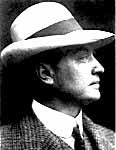
Vilhelm Herold, the great Danish tenor, who interpreted the role of Pedro in the early 20th century
Detailed synopsis of Tiefland
By Leo Melitz, The Opera Goer's Complete Guide, 1921
(Translated by Richard Salinger, revised and brought up to date after
consultation with the Librarian of the Metropolitan Opera Company
by Louise Wallace Hackney),
TIEFLAND
Music drama, in three acts and a prologue, adapted from the work of
Guimera by Lothar. Music by Eugen d'Albert.
CAST: Sebastiano, a rich landowner. Tommaso, an old man. Moruccio,
Martha, Pepa, Antonia, Rosalie, Nuri, Pedro, Nando, all in the service
of Sebastiano. A priest. Place, the Pyrenees and the valley of
Catalonia. First production, Prague, 1903.
PROLOGUE: A rocky fastness in the Pyrenees. The shepherd Pedro, as long
as he can remember, has lived among the hills, which be loves. (Pedro:
"Wonderful 'tis to me.") He seldom sees any one except his
fellow-shepherd, Nando, and women almost not at all, but he dreams that
the Mother of God will some day send him a wife. (Pedro: "Nay, de not
laugh, I mean it.") He is satisfied with his free life (Pedro: "Glorious
'tis to me") and thankfully repeats the Paternoster. His employer, the
rich Sebastiano, has forced the beautiful Martha to accede to his
desires, installing her as manager of the mill. He now wishes her to
marry (Sebastiano: "Have no fear") and to take Pedro for her husband. He
has brought her to the hills with this end in view, trusting to Pedro's
ignorant simplicity and obedience for the rest. Pedro, of course, thinks
the long-wished-for wife has been sent to him, and willingly consents to
go to the Lowlands and live with Martha in the mill. Martha is less
willing and will not look at Pedro. She departs with Sebastiano, and
Pedro tells Nando of his good fortune. (Pedro: "Joy comes to me!")
ACT I. The interior of the mill. Sebastiano's servants know that he is
Martha's lover, but that their master must make a rich marriage to
maintain his position. They discuss the matter, and little Nuri
innocently tells them of a conversation she has overheard between
Sebastiano and Martha. (Nuri: "If I walk, and walk, and walk"; " 'Twas
eventide.") The maidservants scorn Pedro, who, unaware of the situation,
is betrothed to Martha ("This great fool knows less than nothing"), and
joke broadly with Martha over her coming nuptials. She drives them away,
bitterly complaining of her loneliness. (Martha: "No one have I to help
me in my need.") Nuri tries to make her smile, but her innocent
questions only hurt, and Martha sends her away. (Martha: "His, body and
soul.") Moruccio tells old Tommaso the real state of affairs, and they
quarrel. The villagers are hilarious over the deception of Pedro.
(Pedro; "I thank you all.") The marriage takes place, and it is
Sebastiano's intention to return at night and visit Martha as usual.
(Sebastiano: "Martha, you know.") She, wishing to avoid him, does not
enter her chamber, nor does she ac-company Pedro, although she is now
convinced that the simple shepherd has acted in good faith and knows
nothing of her relations with Sebastiano. (Pedro: "You mean that I have
earned this without working.") Poor Pedro is puzzled by her strange
conduct and tears, and knows not what to do. (Pedro: "Now what to do I
scarcely know.") A light appears suddenly in Martha's room - Sebastiano'
s signal - which adds to the mystery.
ACT II. Same scene, at dawn. Nuri is heard singing outside. (Nuri: "The
stars are going to sleep.") She enters, knitting industriously, and
tells Pedro she is making him a fine new jersey. He replies that he is
going away. (Pedro: "Yes, far away from Martha.") Martha's love is
turning toward her husband, and she becomes jealous of Nuri, driving her
from the house. Pedro goes with her, and Martha, running after them,
half distraught, meets old Tommaso. She confides in him, explaining that
her old rascal of a stepfather had sold her to Sebastiano. Tommaso
advises her to tell Pedro all. (Tommaso: "Every one laughs, and Pedro
knows not why"; Martha: "Think of your own dear daughter.") She feels
that Pedro really loves her. (Martha: "Let him despise me, then! He
loves me.") The old man leaves her with his blessing. (Tommaso: "In God'
s strong arms I leave you.") The chattering women drive Pedro to return.
He shakes one of them in exasperation, then entering the house, tells
Martha he must go back to his solitude in the hills. She asks him to
take her with him, and he answers her with bitterness. (Martha: "Ah!
thou art right. With my beloved.") She laughs hysterically, and Pedro
advances with a knife to kill her. (Martha: "Only a weariness is life to
me!" Pedro: "I sought to kill the woman whom I love!") He suffers
remorse, and they determine to fly together. (Duet: "There shall we go,
high up in the hills!") They are intercepted by the villagers, who enter
with Sebastiano to congratulate them. Sebastiano, with effrontery,
thrums on a guitar for Martha to dance as of old. (Sebastiano: "Wind
round your form the seductive mantilla.") He strikes Pedro, who rushes
at him furiously, but is overpowered by the villagers and dragged away.
ACT III. The same scene. The news of Sebastiano's conduct has caused the
rich heiress to reject him. With increasing passion he desires Martha,
but she loves Pedro. (Sebastiano: "Little sweetheart, you are mad.") He
defies God. ("Heaven has no ears for you.") Martha scornfully refuses to
listen to him. ("No longer am I weak and helpless.") She calls to Pedro.
He has escaped and bounds into the room like some savage animal, drawing
a knife. ("Sneak away, wouldst thou, coward dog!") Seeing Sebastiano is
unarmed, he throws down his weapon and they fight with their bare hands.
Sebastiano tries to pick up the knife. Pedro puts his foot on it, and
flies at his enemy's throat. Silently they wrestle, until Pedro throws
Sebastiano aside as if he were a rat and calls the people in to witness
his work. Scornfully he asks them, as they stand dumb with amazement,
why they do not laugh now. (Pedro: "Well, good friends, why don't you
laugh?") Then, bearing Martha in his strong young arms, he escapes with
her to freedom among the mountains. (Pedro: "Far up, far up in the
mountains! To sunshine and freedom and light.")
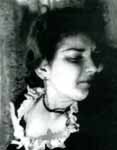
Maria Calllas as Marta Athens 1945
Recording Review
Ian Lace, Music on the Web (UK), 1999
Eugen D'ALBERT Tiefland Eva Marton; René Kollo; Bernd Weikl; Kurt
Moll. Münchner Rundfunkorchester conducted by Marek Janowski
ARTS 2CD 47501-2 (134:46)
[...] The drawback with this 2 CD set is that although there is a
substantial enough booklet with good notes in English, French and
German, the libretto is only in German so unless the listener is fluent
in that language, it is impossible to appreciate all of D'Albert's
subtleties and nuances. Briefly, the story concerns a rather naive and
lonely young shepherd, Pedro who is persuaded by landowner, Sebastiano
to descend from his mountain home to the plains below and to marry the
lovely Marta.
Marta is Sebastiano's young ward and mistress. Sebastiano has an
ulterior motive because he wants to make a good profitable marriage to
bolster his dwindling assets - but he also wants to keep Marta as his
mistress. At first Marta is repulsed by the guileless Pedro who she
thinks is a rogue but when she realises that he is innocent and really
loves her, she falls in love with him when she discovers Sebastiano's
deception. Pedro and Marta confront Sebastiano with their love but he
will not let Marta go particularly as he knows that he has now lost
everything because his intended bride has also been told of his
duplicity. In the ensuing fight between Pedro and Sebastiano, Sebastiano
is killed and Pedro and Marta flee for the purer atmosphere of the
mountains.
The cast is impressive in this 1983 recording. René Kollo is as
magnificent as he was as Walther in the 1971 Karajan recording of the
Die Meistersinger as he ranges from incredulous innocent, to ardent
lover, to vicious avenger. Bernd Weikl is also excellent as Sebastiano,
the scheming villain with a heart. Eva Marton also impresses as Marta
but curiously the important role of Nuri is not credited in the
booklet's cast list (although more minor characters are!). The best
material is given to the men. Highlights include: the evocative
orchestral opening vividly portraying life in the high mountains; the
Act I scene when the village maidens make fun of what they perceive as
the boorish naivety of Pedro and Marta's anxiety about being separated
from Sebastiano against lively Richard Strauss/Viennese-like material
followed by Sebastiano's Ochs-like reassuring serenading of Marta to
similar material found in Der Rosenkavalier but with more passion and
irony (the orchestral accompaniment at the end of this scene is
positively ravishing). Act II highlights include Pedro's big aria the
wolf song in which he tells Marta of the wolf he had killed on the
mountains to protect his sheep (serving as an allegory for the situation
between Marta, Sebastiano [the human wolf] and himself); this is
followed by the glorious love duet between Marta and Pedro as Marta
realises the truth of the situation.
Janowski leads his his choir, orchestra and soloists in a passionate and
moving performance of this much negelected opera - little wonder that it
had such an effect on Korngold! At such a bargain price this is an
operatic set that everyone who loves full blooded late Romantic music
should snap up without hesitation.
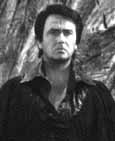
Rene Kollo, Pedro in
the 1983 recording
'Leni Riefenstahl's self-reflection and romantic transcendence
of Nazism in Tiefland'
By Robert von Dassanowsky, Camera Obscura 35, 1995/96
[...] Tiefland offers not only the filmmaker's examination of her own
culpability vis-à-vis Nazism but expresses a pre-feminist consciousness
that places her acceptance of fascist militarism and male dominance in
Triumph des Willens in a new and revealing perspective.
Even as Riefenstahl's promotion of Hitler in Triumph generates a palette
of fascist imagery, her Romanticism, like her appreciation of the body
cult cannot be used to reduce her entire output to an example of a
specific fascist aesthetic. Essentially a Bergfilm (mountain film) maker
and a nature-mystic, Riefenstahl gave Hitler's set pieces the needed
emotional association with German tradition and culture. As B. Ruby
Rich, who finds German Romantic painting influential in Triumph,
understands: "the principles of Romanticism [were] subjugated to the
Nazi ideology by means of specifically Romantic pictorial devices." The
concept of the nature-bound outsider as prophet, so prevalent in
Riefenstahl's work, is also to be found throughout the German Romantic
literary canon, in the works of Novalis, Tieck, Goethe, von Eichendorff,
and Hölderlin, where it is anything but reactionary or authoritarian.
Furthermore, Eric Rentschler has shown that the celebration of mountain
purity in Arnold Fanck's Alpine epics of the 1920s and 1930s, and in Das
blaue Licht, does not after all, aim to provide "proto-Nazi sentiments"
of "Führer-worship." The Romantic Bergfilm genre has been reworked and
adapted in popular German cinema from its birth in the early Weimar
Republic through the West-German Heimatfilm (homeland film). Renschler
also believes that Das blaue Licht "crosses borders and defies fixities"
in its ideological and technical adaptation of the Bergfilm. I feel that
Tiefland, in turn, should be seen to cross and defy the filmmaker's
previous concepts and conventions, most importantly in the use of her
established Romantic vocabulary to subvert and counter a paradigmatic
authoritarian order.
Despite their similar function as erotic stimulus to the male
characters, the social outsiders portrayed by Riefenstahl in Das blaue
Licht and Tiefland are distinctly different from each other. The
mountain girl Junta in Licht is destroyed by the materialism of the
villagers and is a male fantasy image, a martyr, a "mythical essence."
Her mimosa-like nature, her aesthetic-spiritual understanding of the
blue crystals, and her final transformation into an icon, denotes a
vague messianic image. The character of Martha in Tiefland is first a
very human opportunist with no lofty qualities or notions. Her eventual
desire to help those oppressed by her "Führer" speaks of sympathy and
humanism not martyrdom or utopianism. Similarly, Tiefland's concept of
transcendence is a simplistic and personal one, not the occult manifesto
of Das blaue Licht. Indeed, Renata Berg-Pan finds Tiefland to be weak
because "Riefenstahl no longer had the same relationship to the topic
which had compelled her to take it up in 1934. She had outgrown the
emotional bonds attaching her to the theme." In his 1972 BBC interview
with Riefenstahl, Keith Dewhurst dispels Riefenstahl's early mysticism
with Tiefland, marking it as "the first time in one of her films [that]
she tells a story with a social message-poor peasants against a rich
landlord." What Riefenstahl presents of herself and, her art in Hitler's
Germany via Tiefland ultimately makes it as important as any film of her
career. [...]
[...] Although Sanders-Brahms believes that Riefenstahl understood the
opera to echo her own situation, she does not mention that Riefenstahl
increased the self-reflexive quality of the film by altering the
original opera plot to preseat Martha as succumbing willingly to
seduction by the evil Marquez. Nor does she detail Martha's opportunism
in order to become an admired and respected lady. Berg-Pan originally
sets up the basis for such autobiographical analysis but does not pursue
this line of inquiry. She is convinced that the scene in which the
Marquez (Bernhard Minetti) enters the inn to witness Martha's dancing
has fascist overtones: "the master Don Sebastian peremptorily stomps
into the inn, is immediately greeted by the peasants with bowed heads
and other forms of self-humiliation, and as the master, is welcomed by a
woman who can entertain him. He has the power to take her, and she
submits without question." In presenting Martha and her dance to the
observant Marquez, director Riefenstahl assumes the mate gaze to
objectify and eroticize her own image, prompting one male critic to
comment on the film's "undulating bosoms." But the gaze is from the
point of view of the boorish male peasants who paw her and of the
Marquez Don Sebastian, the powerful, abusive leader. Despite
Riefenstahl's awareness of her own photogenic beauty, she would be, by
the filming of Tiefland, more conscious of the subservient female role
in Nazi society and her own problems as female artist in Nazi political
circles than earlier in her career. Oppressive male dominance is one of
the guiding themes of the film, therefore Riefenstahl must connect the
traditional male figures with an objectifying male gaze. She later
subverts this gaze by the actions of Martha and with the non-traditional
male figure of Pedro. [...]
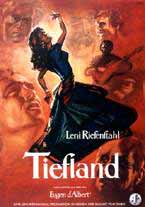
Contemporary poster for the Leni Riefenstahl film version of Tiefland
Sources & Bibliography
Biographical notes: Eugen D'Albert
Review of the Marton/Kollo recording
www.musicweb.force9.co.uk/music/classrev/Apr99/tiefland.htm
Biographical notes: Àngel Guimerà
www.escriptors.com/
Tiefland plot and musical analysis by George P. Upton
www.intac.com/~rfrone/operas/Books/Upton_Standard/Albert.htm
Detailed synopsis of Tiefland by Leo Melitz
www.intac.com/~rfrone/operas/Books/Melitz_Complete/
'Leni Riefenstahl's self-reflection and romantic transcendence
of Nazism in Tiefland' by Robert von Dassanowsky
www.powernet.net/~hflippo/cinema/tiefland.html
Texts of Guimerà's poetry (in Catalan)
www.mallorcaweb.com/Mag-Teatre/poemes-solts/guimera.html
www.xtec.es/~evicioso/bcnes/guitibid.htm
Detailed biography and literary essay on Guimerà (in Catalan)
www.uoc.es/lletra/noms/aguimera/index.html
Complete German libretto of Tiefland
www.impresario.ch/libretto/libdaltie.htm
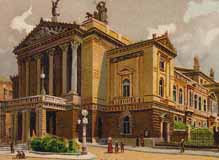
The Prague State Opera House where Tiefland premiered in 1903
This page was last updated on: September 9, 2003